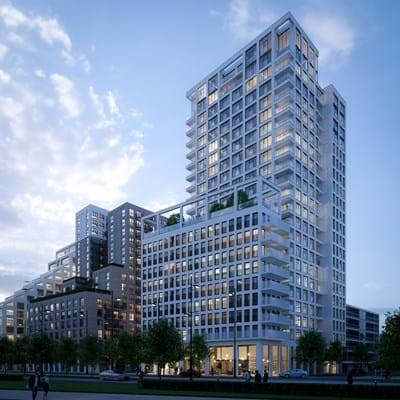- Home EN
- News
- Latest news
- 2022
- NEXT apartments: genuinely smart living in Eindhoven
NEXT apartments: genuinely smart living in Eindhoven
A new way of living will get underway in the bustling Eindhoven district of Strijp-S in November this year when residents will move into NEXT, the first residential building in the Netherlands offering smart energy consumption. Bouwinvest and its partners VolkerWessels iCity and TNO will conduct research into the smart home concept in the coming years as part of the European Interconnect project which continues to involve residents in the development and use of their homes.

Bouwinvest participates in European innovation project Interconnect for sustainable energy use
Efficient energy use, reduced peaks in the electricity network and increased living comfort: the innovative technology incorporated in the NEXT apartments will lead to a new way of living. For example, the dishwasher will automatically know the optimal time to wash plates and glasses, while the ventilation system will generate enough fresh air at times when visitors are present. The customised software in the equipment is connected to a smart system which residents can control via their smartphone or a screen in their living room and challenges tenants to optimise their energy consumption. This enables residents to live comfortably while contributing to the energy transition and the development of sustainable cities. The load on the power grid can be reduced by using appliances at the most favourable non-peak times with the help of a smart control system.
Residential comfort rises to new heights
NEXT is a striking and robust apartment complex, consisting of three residential sections where Bouwinvest is offering 99 luxury apartments in the free-sector rental market. NEXT is 'revolutionary', according to Rob Linssen, Asset Manager of the Bouwinvest Dutch Residential Fund: "The apartments are equipped with the latest gadgets in the field of smart living, health and sustainability. This optimises living comfort, because the integrated household appliances respond to the schedules and wishes of residents as well as the energy network itself. The project is also a clear statement in terms of sustainability and Bouwinvest's commitment to Paris Proof real estate. We now turn the thermostat down two degrees ourselves to offset the current extreme rise in energy costs, but the smart home of the future will determine the optimum balance between energy consumption and comfort itself, at any time of day, and in accordance with the occupant's wishes. The smart NEXT homes will be able to do this as early as next year."
European innovation
Interconnect is a European-funded innovation project that is creating a universal protocol in commercial and residential buildings where devices 'talk' to each other without any need for physically converting the actual equipment. ICT and energy come together in what is called interoperability. Experiments with this innovative technology are being conducted at the NEXT apartments and similar residential complexes, as well as in shopping malls and logistics properties in Portugal, Sweden and Italy, among others. Close cooperation with various chain partners is essential to achieve these 'smart cities'.
Ready for the future
Ronnie Groenewold of smart city experts VolkerWessels iCity: "Energy requirements are increasing worldwide, particularly in cities. At certain times of the day, there is so much demand that the power grid becomes overloaded, for example due to the increased use of electric cars and large-scale consumers such as data centres. Energy is becoming scarcer which is why we are introducing a smart energy system that is ready for the future. If the retrofitting of these 99 rental and owner-occupied apartments is a technological success and helps residents increase their living comfort, we can apply it on a larger scale in Europe."
Research into residents' needs
The attractiveness and use of the smart services are continually being assessed. TNO, the Netherlands Organisation for Scientific Research, also recently published a study showing that tenants find the smart dishwasher the greatest attraction for two key reasons: its environmental contribution and cost savings. Luise Schlindwein, behavioural scientist innovator at TNO, says it is important to involve users in the development of technological innovations: "These smart services offer opportunities but also create uncertainty, because it is still unclear how these innovations work in practice. Will my electric car be adequately charged so that I can get to work on time? Is there a fire hazard when the smart dryer switches on when I'm not at home? These concerns are precisely why we, in collaboration with Bouwinvest and iCity, interviewed potential users to gain insight into their wishes, needs and concerns so that we can respond to them as well as possible."
Continuous monitoring
TNO also made recommendations to develop NEXT. As a result of their research, for example, residents are offered an app on their phones so that they can communicate with the smart services in their apartment. This also creates transparency on how personal data is processed, if at all. Parallel to this, Bouwinvest asked its tenants panel about the use of innovative technology and discovered that tenants also view the energy cost savings from smart grid deployment as a major benefit. Once the technology has been implemented and residents are actively using it, TNO, Bouwinvest and iCity will conduct follow-up research into its use by residents.
More information
Construction of the NEXT apartments in Eindhoven began in 2020 by Stam + de Koning Bouw and is expected to be completed in October 2022. Bouwinvest is offering the apartments via http://www.hureninnext.nl/. The technological development is being coordinated by VolkerWessels iCity and Interconnect while TNO is conducting research into residents' demands.


